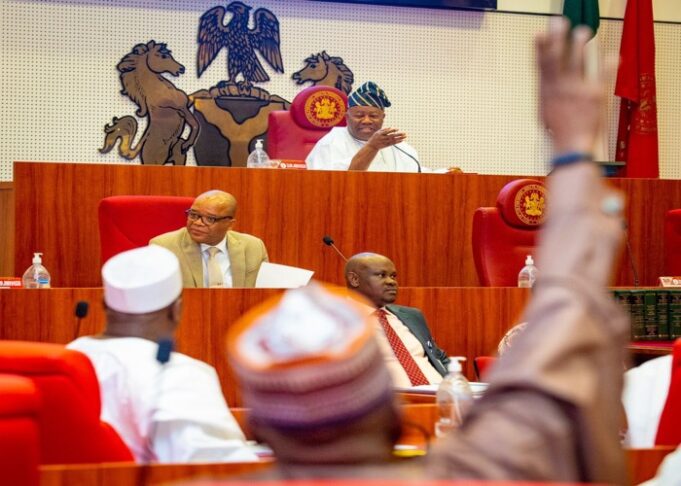The Senate has directed its Committee on Federal Character and Inter-Governmental Affairs to investigate the compliance by Ministries, Departments and Agencies (MDAs) with federal character principle, in line with sections 14(3) and 14 (4) of the 1999 Constitution (as amended).
The Senate the investigative hearing was to ensure fair and equitable representation across all zones and ethnic groups in appointments, promotions, and recruitment.
The resolution followed the adoption of a motion sponsored by Osita Ngwu (PDP-Enugu) at plenary in Abuja on Tuesday, March 25, 2025.
Ngwu, in the motion entitled, “Urgent need to address systemic abuse and ineffective implementation of federal character principle in Nigeria’s public sector”, said systemic abuse had become a major challenge to achieving balance and equity within Nigeria’s public service.
He said the challenge was due to limited recruitment opportunities, skewed promotions based solely on years of service and insufficient avenues for worker-mobility outside the public sector.
According to him, the federal character principle mandates fair representation in federal appointments to reflect linguistic, religious and geographic diversity of the country.
Ngwu quoted section 14(3) and (4) of the constitution as stipulating that “no predominance of persons from a few states or from a few ethnic or sectional groups should exist within the federal government or its agencies.”
The lawmaker said despite the focus on geographical quotas, imbalances still persisted with some institutions, often relocating problems rather than resolving them, while certain zones remained under-represented.
The senator expressed concern that the process of addressing public sector disparities had been undermined by institutional inertia and lack of accountability.
Judge withdraws from Natasha’s suit against Akpabio
This, he said, was particularly prevalent in the area of recruitments at senior levels and influenced more by internal preferences than by merit and fairness.
“The quota system has, in many cases, created confusion between merit-based recruitment and equitable state representation, to the detriment of discipline, morale and institutional efficiency,” Ngwu said.
The lawmaker stated that the constitutional criteria for equitable distribution of employment required that each state contributes its proportionate quota of 2.75 per cent to the national workforce.
“The Federal Capital Territory (FCT) account for 1.00 per cent of the workforce, while catchment areas are to address localised recruitment for junior staff up to 75 per cent of positions,” he added.
Ngwu also noted that Order 96(27)(b) of the senate rule 2023 and sections 62, 88, 89, 143-(4) of the constitution gave its committee power of legislative oversight on matters relating to implementation and monitoring of policy on federal character.
Ngwu alleged that various federal institutions had consistently failed to adhere to federal character mandates, often by-passing regulations in their recruitment exercises, adding that evidences abound.
He listed some of the agencies to include the Nigerian National Petroleum Company Limited (NNPC Limited) and its subsidiaries like Nigerian Upstream Petroleum Regulatory Commission (NUPRC).
Others, he said, were NAFDAC, the Nigerian Ports Authority (NPA), the National Pension Commission (PenCom), the Nigerian Deposit Insurance Corporation (NDIC) and the Federal University of Technology, Akure (FUTA).
He also listed Small and Medium Enterprise Development Agency of Nigeria (SMEDAN), the Energy Commission of Nigeria (ECN), the Nigerian Nuclear Regulatory Authority (NNRA) and the National Library of Nigeria (NLN) among those flouting the federal character principle.
The Senate, following intense debates from Senators Abba Moro,(PDP-Benue), Adamu Aliero (PDP-Kebbi), Seriake Dickson (PDP-Bayelsa), Olalere Oyewumi (PDP-Osun), Victor Umeh (LP-Anambra), Anthony Ani (APC- Ebonyi), Adams Oshiomhole (APC-Edo), mandated the committee to turn in its report in three months.
- Sultan announces Sunday for Eid-el-Fitr, says moon sighted in Nigeria - March 29, 2025
- Myanmar earthquake death toll rises to 1,644 - March 29, 2025
- Rivers ex-HoS accuses Fubara of burning Assembly complex, gov denies - March 29, 2025








